It’s been a really weird year, hasn’t it?
Over the course of the Panera Bread we are very much still living through, we’ve talked a lot about how reading habits have changed. Many expressed an inability to read anything new. The mental exhaustion made it hard for folks to concentrate, the emotional exhaustion made it hard to take in anything new, to expose oneself to unpredictable emotional journeys. Priorities changed, spending habits changed. Maybe you had kids to take care of at home. Maybe you just didn’t want to give your money to A Large Corporation and there weren’t any indie bookstores delivering near you. Or maybe you only wanted to read something you knew would have a happy ending, an escape to something gentler than the world around you. Whatever the case may be, our relationship to reading has shifted.
I feel very lucky that reading is part of my life, but even so, the way I read has changed. I feel less able to commit to big series, I find it difficult to get through anything with too much violence. I sure as hell won’t be reading any pandemic dystopias any time soon. But I still feel incredibly grateful for the plethora of good stories that are out there. No matter what, I’m always able to find characters to fall in love with, and beautiful new worlds to escape to.
And I love being able to share them with you.
If you’re looking to return to familiar worlds, not only are we getting conclusions to Ken Liu’s Dandelion Dynasty (The Veiled Throne, Saga Press, November 2), Fonda Lee’s Green Bone Saga (Jade Legacy, Orbit, December 2), Shelby Mahurin’s Serpent & Dove series (Gods & Monsters, HarperTeen, July 27), Natasha Ngan’s Girls of Paper and Fire series (Girls of Fate and Fury, Jimmy Patterson, November 2), The Age of Darkness Trilogy from Katy Rose Pool (Into the Dying Light, Henry Holt and Co. BYR, September 21) and L.L. McKinney’s Nightmare-verse (A Crown So Cursed, Imprint, November 9).
We’ve also got incredible sequels coming in the latter half of the year, including Jordan Ifueko’s Redemptor (Amulet Books, August 17), Amparo Ortiz’s Dragonblood Ring (Page Street Kids, October 12), Hannah Abigail Clarke’s Scratch Daughters (Erewhon, September 14), Truth of the Divine from Lindsay Ellis (St. Martins, October 12), Our Violent Ends by Chloe Gong (Margaret K. McElderry Books, November 16), The Devil You Know from Kit Rocha (Tor Books, August 31), The Second Rebel by Linden A. Lewis (Saga Press, August 24), H.G. Parry’s A Radical Act of Free Magic, The Queen Will Betray You from Sarah Henning, Marie Rutkoski’s The Hollow Heart, Some Faraway Place from Lauren Shippen’s Bright Sessions series, Steelstriker from Marie Lu, and A Psalm of Storms and Silence from Rosanne A. Brown. We’re also getting two from T.J. Klune, The Extraordinaries’ sequel Flash Fire, and House in the Cerulean Sea’s follow up, Under the Whispering Door.
Plus, we’ve got some incredible new ones coming from major genre players, including Chuck Wendig’s The Book of Accidents (Del Rey, July 20), Gregory Maguire’s latest entry into the Wicked universe, The Brides of Maracoor (William Morrow, October 12), Noor from Nnedi Okorafor, and two from Charlie Jane Anders—her nonfiction book on writing, Never Say You Can’t Survive (Tor Books, August 17), and a short story collection, Even Greater Mistakes (Tor Books, November 16).
If you’re ready to venture into something new, join me in escaping with these highly anticipated titles for the rest of the year.
The Jasmine Throne by Tasha Suri (June 8, Orbit)
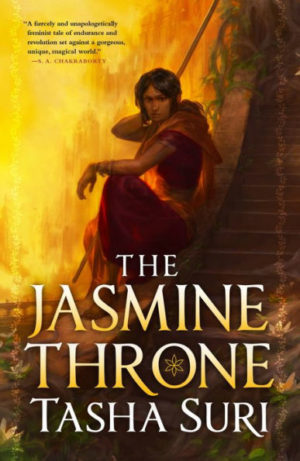
Be prepared for The Jasmine Throne to immediately pull you in and never let you go. Tasha Suri (she/her) has written a truly epic fantasy centering two women who defy all the expectations put on them. Priya is a maidservant in the Regent’s mahal, Malini is an imprisoned princess, and sister to a cruel emperor. Because Malini refused to sacrifice herself, she is banished to the Hirana, a temple that once held incredible magic but was destroyed in a tragedy that killed most of its inhabitants. Priya is a child of the Hirana that made it out alive, and it’s a secret that she’s desperate to keep. When Malini discovers the truth, the two of them are set on a path to topple an empire. Oh, right, and there’s also a terrible disease ravaging the nation, major wealth disparity, and the iron grip of patriarchy that they’re up against. It’s a complex story with many interwoven plot lines, but none of them feel like throw-away subplots—every detail here matters. Both of these women are kind of terrible humans who pine for each other in such an achingly beautiful way, and both have opportunities to show the fullness of what it means to be a woman. It’s just so much and so wonderful. Trust me when I say this story will stick with you long after the last page, and will keep you yearning for the sequel.
The Wolf and the Woodsman by Ava Reid (June 8, Harper Voyager)
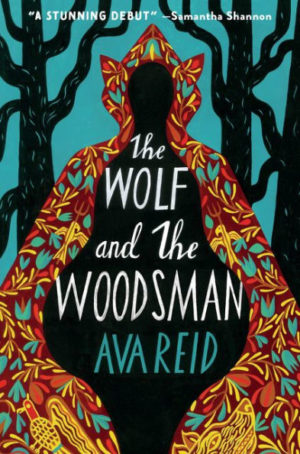
Please be warned that this is not a fairy tale, certainly not one that’s been Disney-fied. There are elements that feel that way, familiar motifs—magic, dark woods filled with monsters—but the world of Ava Reid’s (she/they) novel is harsh and unforgiving. Évike has grown up in Keszi, a small town on the outskirts of the woods populated with magical girls. It’s an unlucky positioning for Keszi becomes the town targeted by the vicious Woodsmen, a religious order of the Patrifaith, the monotheistic religion practiced in the rest of the country. Unfortunately this is a familiar happenstance: religions gain power and seek to cleanse non-believers from the land. But this king needs pagan magic, and so demands a sacrifice in the form of a girl from Keszi. Évike doesn’t have any magical gifts, but is given to the Woodsmen in place of someone else, and sent off to her expected death. But there are secrets in the kingdom, there are power imbalances, misplaced loyalties, and unexpected alliances to be made. Reid expertly weaves Hungarian culture and Jewish history into an intense fantasy experience, with plenty of emotional highs and lows. (Also it features one of our favorite tropes. I’m not gonna spoil it but you’ll figure it out pretty early on. We love to see it).
The World Gives Way by Marissa Levien (June 15, Redhook)
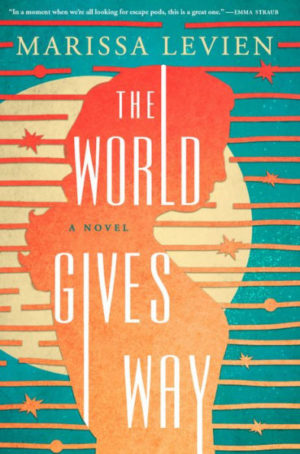
Sometimes all it takes is something simple and unexpected to upend the world we know. The World Gives Way, the debut novel from Marissa Levien (she/her) brings us onto a generation ship, stratified into a world of haves and have-nots. Humanity left Earth generations ago to venture somewhere new, but it has been so long that the inhabitants, the world, have forgotten what Earth was like. And their destination is hundreds of years away. Myrra is a have-not working as a “contract” worker, and she’s locked into a 50 year deal with a wealthy couple and their small child. That couple’s connections and social standing means that they know something no one else does—they’ve known for a very long time actually—that the world as they know it is in danger of ending. There’s something wrong with the ship. And now Myrra has only a few weeks to live, and a baby to take care of. This novel asks the big question: What would you do with your time, if you knew it was coming to an end? What choices would you make? The World Gives Way is expansive in its world building but intimate in its characters and emotions. It is both simple and unexpected in the best way.
This Poison Heart by Kalynn Bayron (June 29, Bloomsbury)
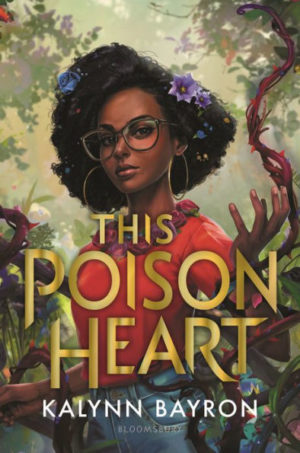
I think a lot about how frequently the speculative fiction community throws around the word ‘retelling’. Often said ‘retellings’ look absolutely nothing like the originally story they’re supposedly based on, and while shades of inspiration might be present, authors really know how to take a concept and run with it in their own brilliant direction. The sophomore novel from Kalynn Bayron (she/her) falls into this category along with her first, Cinderella is Dead. They told me This Poison Heart was a Secret Garden retelling. With the exception of the aforementioned secret garden, it is something entirely new and fantastic. Our heroine Briseis has a unique ability to cultivate plants, but trouble controlling it, and has little to no understanding of why she is the way she is. And it comes as a total surprise to her when an aunt she’s never met dies and she inherits a huge estate with acres of gardens waiting for her to bring back to life. But there is, of course, a catch. As Bri begins to understand the extent of her abilities, potentially deadly secrets unfold, and she becomes caught in the middle of an eons-old battle. Bayron perfectly balances dark, creepy, and magical in this novel, and it’ll keep you guessing until the very end.
Six Crimson Cranes by Elizabeth Lim (July 6, Knopf)
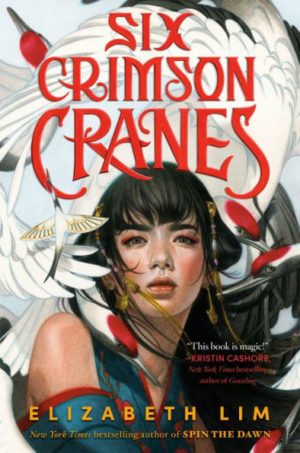
Six Crimson Cranes is another one of those stories that isn’t exactly a retelling. Its inspiration is the less commonly told Brothers Grimm folktale, The Six Swans, but this novel takes the tale in such a new and beautiful direction that it’s barely even worth thinking about the original. Shiori ruins her betrothal celebration trying to hide her forbidden magic: a small enchanted paper crane. When she falls into the lake chasing her crane, it’s a young, mysterious dragon who saves her. The dragon agrees to teach her how to control her magic—oh, and also happens to be a cute boy outside of the water. It comes as a bit of a shock when he tells Shiori that her cold-yet-beautiful stepmother is a powerful sorceress, especially since her stepmother publicly hates magic. But when Shiori gets in her stepmother’s way, her family and way of life comes under threat. Here’s the thing though: despite turning her brothers into cranes and saying she’ll kill one for every word that Shiori speaks aloud, she isn’t really an evil stepmother. It’s complicated, and we love complicated. With an intricate weave of folklore and East Asian culture, Elizabeth Lim (she/her) tells a beautiful story full of elegant magic and led by a witty, strong-willed heroine.
A Psalm for the Wild-Built by Becky Chambers (July 13, Tordotcom Publishing)
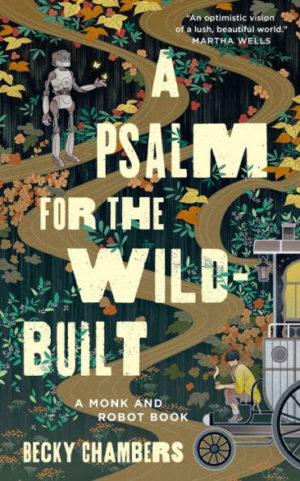
It is easy to say this book feels like a warm cup of tea, but it’s more than that. Because a good cup of tea is always more than that. It’s comfort, a reminder to slow down and enjoy simple pleasures. Tea can evoke memories of simpler times, family, rainy days, crisp mornings. As much as the history of tea in this country is tied to colonialism, so many cultures have tea histories, often involving ceremony and meaning tied to specific types of teas. Becky Chambers (she/her) has written a book that feels like all of that. In this world, the robots have broken away from society and gone into the wilderness, and humans have been left with a mostly technology-less existence for centuries now. Sibling Dex has left their monastery to join the world as a tea monk, which means their primary task is to make tea for people and listen to their stories. The last thing Dex is expecting is Mosscap, a robot who emerges from the wild and joins them on their path. A Psalm for the Wild-Built is not only a musing on what it means to be human, but what it means to be kind, to be a friend, to find understanding with those who have different experiences from you. It is about finding your place and purpose in the world, and holding on to wonder. Pick up this book, brew yourself a cup of tea, and have one of the best experiences of your reading life.
She Who Became the Sun by Shelley Parker-Chan (July 20, Tor Books)
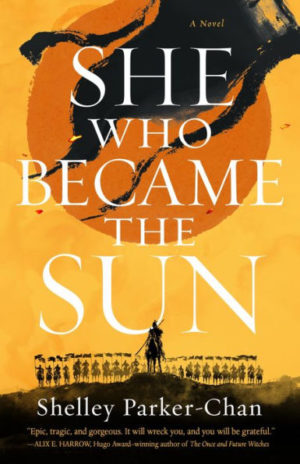
Shelley Parker-Chan (she/they) is poised to become an absolute powerhouse of the genre, so it’s time to get in on the ground floor. This is an exquisite work of historical fantasy that tackles big questions like fate, faith, and identity. The world of She Who Became the Sun is harsh on its daughters—during a long drought, parents are willing to sacrifice their daughters’ lives in favor of sons. Sons have purpose, sons have destiny. But when a bandit attack leaves both her father and brother dead, Zhu decides to survive by taking her brother’s name, and in turn, his path in life. And let’s be honest: the trope of girl characters in fantasy dressing as boys to escape patriarchal society is common. But rarely is it done with such introspection and questioning the way gender operates. By venturing into the world as a man, Zhu takes on challenges that would have been thought impossible for a girl, and reckons with the intersections of power, sexuality, and gender performance. The story is a take on the founding of China’s Ming dynasty, and deals with intentions and choices vs destiny. This book is set to become one of the great works of genre-bending fantasy, so make space on your shelf alongside Priory of the Orange Tree and Jonathan Strange & Mr. Norrell—a good wide space, cuz this one’s a chonk, but that’s exactly how we like it, right?
A Lesson in Vengeance by Victoria Lee (August 3, Delacorte)
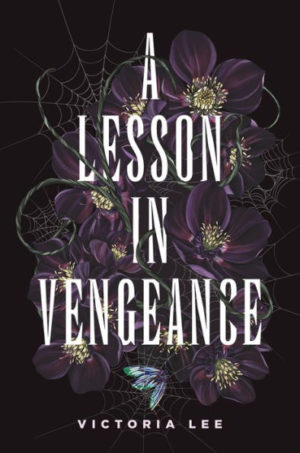
I don’t use the term “atmospheric” lightly—it’s one of those book review terms that I think gets thrown around too freely—but even the opening few pages of Victoria Lee’s (they/them) latest had me mentally back at the boarding school I attended as a teen, wishing for a thick sweater and my hands around a hot cup of tea, to be curled up in the basement of the library. Of course, no one at my school dressed as well as the Dalloway girls, nor were circumstances ever as dark. The story follows Felicity, returning to complete her senior year after the tragic death of her girlfriend, and Ellis, the teen novelist who has enrolled at Dalloway as research for her next book. The curiosity about the school is, of course, its history of witchcraft and mysterious, horrible deaths. What starts off as curiosity leads Felicity and Ellis down a twisted, dangerous path. A Lesson in Vengeance has both a moody aesthetic and vibrant characters within, and is filled with such detail that you’ll be completely drawn in. Lee is at the top of their game here, and is claiming their place in a genre that has been waiting for a book like this.
The Last Cuentista by Donna Barba Higuera (August 17, Levine Querido)

There is a particular joy in stories that are about stories. When I can tell the author really loves their genre and their craft, it touches my old sentimental heart. In this novel from Donna Barba Higuera (she/her), it’s clear from the beginning that she loves books and fiction. Petra, our cuentista, has boarded a rocket bound for the stars along with her immediate family. But there are so many people being left behind, and the planet is about to be struck by a comet. Everyone on board is supposed to be put to sleep for the hundreds of years it’ll take to get to the new planet, and educational programs are being downloaded directly into their minds while they’re dormant. Only, something goes wrong, the plans get corrupted by a rebel group, and memories are being erased. Through a malfunction in the system, Petra is the only one who’s kept her memories and the stories of life on Earth. The Last Cuentista is heartwarming and heartbreaking all at once, and centers family, community, and the oral histories that keep us together.
Bad Witch Burning by Jessica Lewis (August 24, Delacorte)
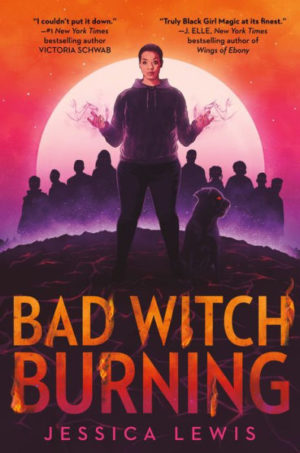
We’ve been blessed, in the past couple of years, with an abundance of titles that feature Black Girl Magic (if you don’t know the term, here is a good primer). Bad Witch Burning is another entry into this legacy, and joins titles like Year of the Witching and Dread Nation in featuring badass Black girls who deal with some pretty dark stuff. Our witch, Katrell, can speak with the dead, and has done a pretty good job of monetizing her power. Because we do what we have to do, right? And things start to get challenging when she discovers she can actually bring the dead back to life, which is a pretty desirable skill to have. Katrell makes decisions in pursuit of money, and in this book we see the complications of an economic system meant to keep certain people down. It’s rare to see a book that tackles issues around poverty—typically money is rarely part of the narrative, and characters seem to magically have enough to get food and necessities despite also fighting aliens or whatever is going on. Jessica Lewis (she/her) does a spectacular job balancing fantastical plot hurdles with character development hurdles, and there are also moments of joy and friendship. Through it all, our heroine remains smart and strong and determined, and it’s her brilliance that powers the narrative.
My Heart Is A Chainsaw by Stephen Graham Jones (August 31, Saga)
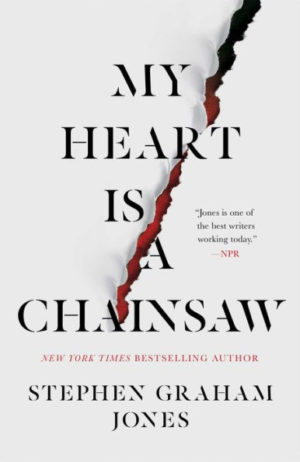
Friends, I’m not gonna lie to you. I’m not usually a horror person—or rather, I’m a very specific type of horror person, which is that in order for me to stomach it, it must be so glamorous and stylized that I don’t notice how terrifying it is. The exception to this rule is Stephen Graham Jones (he/him). It’s just that he’s a master of that creepy, anxious feeling. You know something horrible is going to happen from the very start, we just don’t know is what will happen or when, and it’s in this way that Jones keeps you in suspense throughout this novel. My Heart is a Chainsaw opens with two tourists skinny-dipping in a lake. And of course they go missing, of course there’s something in the lake, of course they’re going to die. And of course we know this doesn’t bode well for the fate of Terra Nova, a high-end gated community that’s being put up on the other side of that lake, which also happens to be nearby an old campsite where 50 children were killed years ago. Jade knows this too; she’s one of the locals, and she’s seen a lot of horror movies. Through Jade, Jones shows off his extensive knowledge of the genre and pays homage to some of the greatest slasher films of all time, while tying it all into ideas about gentrification and life as an Indian in America. It’s wickedly suspenseful and incredibly clever, and might just have made a horror fan out of me.
In the Watchful City by S. Qiouyi Lu (August 31, Tordotcom Publishing)
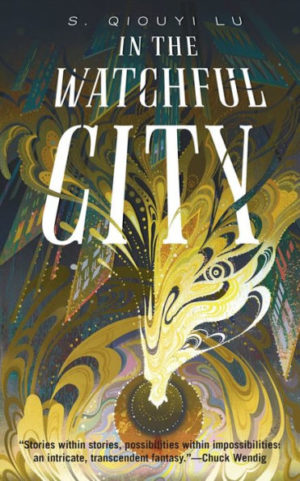
S. Qiouyi Lu (æ/aer) has done something really innovative with In The Watchful City. Not only have æ created a highly developed and intricate cyberpunk world for this novella, but æ has also completely smashed conventions when it comes to neopronoun use. In the Watchful City follows Anima (æ/aer), whose ability to transfer aer consciousness into the bodies of animals and use them to explore and watch the world comes from The Gleaming, the cerebral network æ is connected to. The Gleaming is all æ seems to know, and is primarily used for surveillance and policing of Ora. And Ora is so heavily surveilled because of past collective trauma—sound familiar, anyone? Something terrible happened and the government decided the best reaction was to collect tons of data on its citizens? Right. But Anima’s world changes when Vessel (se/ser) arrives with a mysterious box of items, each paired with a story. And so, In the Watchful City becomes a frame tale. Lu jumps as easily through literary styles and genres as Anima does through animal bodies. Not only is it refreshing to see an author do something completely different and do it well, but it’s also so nice to feel like the genre is progressing to a point where non-binary pronouns are becoming more and more common. Lu is a thoughtful and thorough writer, and aer debut novella is a true accomplishment.
No Gods, No Monsters by Cadwell Turnbull (September 7, Blackstone)
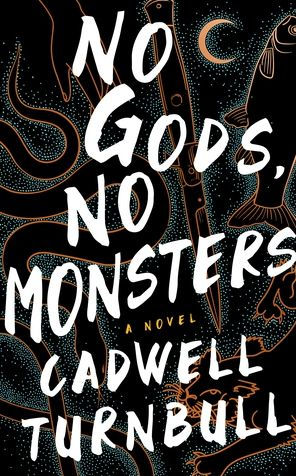
Trust me when I say that Cadwell Turnbull (he/him) is an author you’ll want to be keeping an eye on. No Gods, No Monsters is an automatic pre-order for me, and it’s one of those stories that gets progressively weirder as it goes on, which is my absolute favorite thing of all time. Now, please be warned that this story involved the killing of a Black man by police. But what his sister Laina discovers when she’s given the body cam footage is that her brother wasn’t exactly what she thought he was. She watches the police kill a large animal, only after the shots are fired, it’s her brother there on the pavement. Laina can’t make sense of it, nor of the weird dreams she’s having, or the weird disembodied voice she’s hearing. Suddenly there is video of werewolf transformations on the news and all over the internet. But the discovery of supernatural creatures doesn’t erase how horrible human beings are, and BOY OH BOY DOES IT GET BONKERS FROM THERE. It’s such an expertly crafted novel that I’m almost mad about it; it’s smart and intense in the best way. Turnbull pulls no punches here, and the result is something powerful.
The Inheritance of Orquídea Divina by Zoraida Córdova (September 7, Atria)

I’m not sure how to explain to you the overwhelming joy I felt when I learned that Zoraida Córdova (she/her) was not only making her adult debut, but was doing it with a magical realism novel. It’s a natural evolution for Córdova, who has made a name for herself writing magical, heartwarming stories inspired by Latinx culture. The eponymous Orquídea Divina is the matriarch of a family tree that spans multiple branches and several generations. She might be unlucky, she might be a witch, she might be cursed—but Orquídea’s life is colored by strange enchantment. When Orquídea senses her end is near, she sends letters to all her living family members, inviting them to come home and claim their inheritance. What evolves is family chaos, the revealing of many secrets, and such beautiful magic. Cordova’s love for stories shines just as brightly as her love for Ecuador and the dynamics of Latinx families. The Inheritance of Orquídea Divina is expansive, romantic in its reverence for emotions and the surreal, and a shining star atop Cordova’s writing career.
The Bones of Ruin by Sarah Raughley (September 7, Margaret K. McElderry Books)
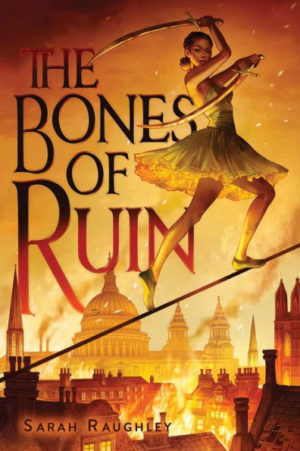
It’s really special when an author can balance thrilling fantasy elements, high stakes, and a larger statement about race and objectification. Inspired by the story of Sarah Baartman and the history of human zoos and freak shows, Sarah Raughley has imagined a world filled with danger, and at the center of it is an immortal African tight rope walker. With no memories from before she joined the circus, Iris has grown used to being a spectacle, especially in Victorian era London. She knows that people expect a show, and as an African woman, she knows people stare. What she doesn’t know is that she’s being watched by the mysterious Committee, who seem to be very interested in killing people. As someone who can’t die, she turns out to be very useful for the Committee’s magical murder tournament, but there’s more to Iris than her abilities. Raughley’s characters shine in this novel, but what shines even brighter is the commentary on bodies as a commodity, especially the bodies of Black women. It’s wild that this is a conversation we’re still having, and an issue that Black women still face. I highly suggest you read the Bones of Ruin, and then go research the history behind its inspiration.
Nothing But Blackened Teeth by Cassandra Khaw (October 19, Tor Nightfire)
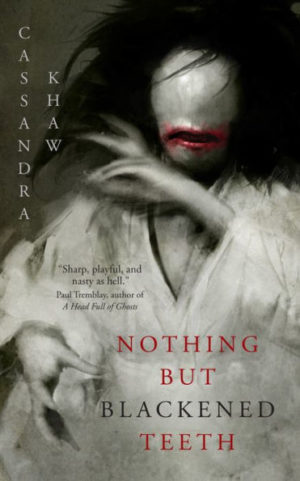
Remember earlier when I said I wasn’t a horror person, save for a particular sort of stylized horror? Nothing But Blackened Teeth is that. Thank you Cassandra Khaw (she/they) for catering to me, specifically, with this tale about a creepy old house. Cat, along with her friends (sort of) Philip, Nadia, Faiz, and Lin have flown to Japan, where Philip has leveraged his rich white boy privilege to rent a haunted Heian mansion for Nadia & Faiz to get married in. As the story goes, another wedding was meant to take place in this house, but the bride was left at the altar and demanded to be buried alive in the foundations to ‘wait for him’, and a new girl was buried somewhere in the house every year after. Perfect spot for a wedding, no? Here’s the thing—these friends have a lot of unaddressed problems in their relationships, and emotions run high as their time in the house goes on. And Cat keeps hearing a woman’s voice, distant and disembodied. This novel is lyrical and hard to get through in the best way, with incredible descriptions that will seize your imagination and place you right in that house with the characters. Khaw is going to terrify you, and you’re going to thank them for it.
A Dark and Starless Forest by Sarah Hollowell (September 14, HMH Books)
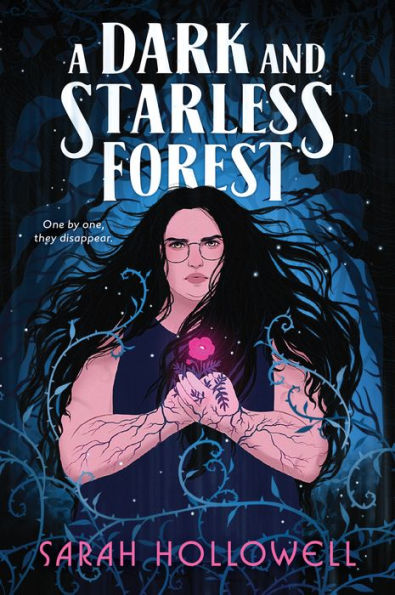
I’ve had A Dark and Starless Forest on my wishlist for ages it feels like, and I’m really excited that it’s finally time. I deeply love fantasies that take place in dark forests. There’s nothing better than a mysterious forest where terrible things happen between the thick trees. Characters both lose and find themselves in the woods, they confront everything wild and frightening about themselves, and come out stronger on the other side. Sarah Hollowell’s (she/her) YA fantasy centers around a family of adoptees, all of whom live away from society because they’re told the world beyond the forest isn’t safe for those with magic. Already you know something is up—it’s just plain creepy that someone would gather witches and hide them away for “protection”. When Derry’s sister goes missing, she ventures into the forest to find her, and things spiral from there. Not only do we get to watch our main character struggle with the darkness within the deeper into the forest she goes, we also get to see wonderful and inclusive sibling dynamics. It’s always w0nderful to see a story that highlights familial relationships rather than a romantic relationship, we just don’t get to see that too often. Hollowell’s debut really dives into how complicated and emotional those relationships can be, especially when magic is involved.
Summer Sons by Lee Mandelo (September 28, Tordotcom Publishing)
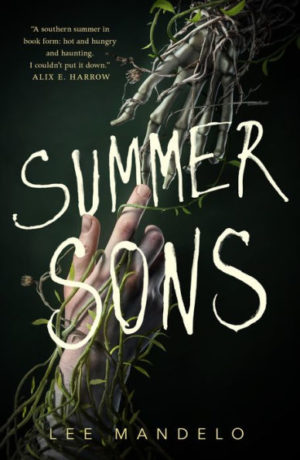
It would be fair to accuse me of being a little biased here, because Lee Mandelo (he/they) has been writing for Tor.com for over ten years. But that doesn’t negate the fact that Summer Sons is good, and there’s nothing better than a southern gothic with feelings. After the death of his best friend Eddie, Andrew returns home to deal with the loss. Part of that dealing includes inheriting Eddie’s assets—oh, and also his ghost. Andrew is pretty convinced that Eddie didn’t take his own life, and the hauntings that are happening to him seem to be pointing in that direction too. There’s a lot Andrew didn’t know about his friend, and the truth is darker than he could have ever expected. The book perfectly captures that particular weight of Southern heat and the way it shimmers on pavement, the sound of insects buzzing in your ears, the slow haze, and how weird it makes everything feel. It’s about grief and unresolved feelings, but also about boys. Messy boys, both in the “leave your dirty socks out” kind of way and also in the “leave your heart on the line” kind of way. Mandelo’s debut is unexpected and beautiful, and also made me feel a lot of things about my gender. Also, if you’re one of those people that got really into cars after reading The Raven Boys, this will be right up your street too (ha, see what I did there?).
Light From Uncommon Stars by Ryka Aoki (September 28, Tor books)
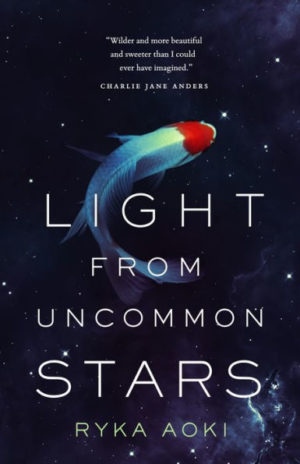
This is one of the absolute best things I have ever read in my entire life.
That is all.
A Spindle Splintered by Alix E. Harrow (October 5, Tordotcom Publishing)
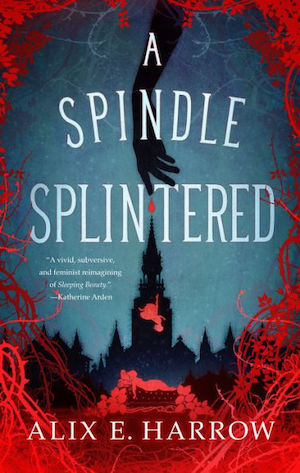
A Spindle Splintered is a book that begins with a takedown of how bizarre and patriarchal fairy tales are, especially that of Sleeping Beauty—whose primary value within the story is in her attractiveness as a near-dead body. But Zinna Gray is about to die (a chronic illness there’s no cure for), she believes she only has another year left, and Sleeping Beauty is on her mind. To top it all off, her best friend throws her a Sleeping Beauty themed 21st birthday party, complete with a spindle to prick her finger on. But when Zinna does so, it sends her spinning into the world of fairy tales. Thankfully, she’s still able to text her friend back home. Princess Primrose has, of course, been cursed by an evil fairy to prick her finger and be sent into a centuries-long sleep, but the curse didn’t say anything about Zinna’s arrival. Zinna is an incredibly self-aware protagonist as she and a very real princess investigate the nature of curses, fate, death, and whether or not to adhere to traditional narrative structure. Alix E. Harrow (she/her) is a master storyteller who clearly had a lot of fun writing this one. With beautiful artwork based on the classic Arthur Rackham illustrations, A Spindle Splintered is a fantastic and playful piece of work with strong feelings about the expectations put on young women.
Dark Rise by C.S. Pacat (September 28, Quill Tree)
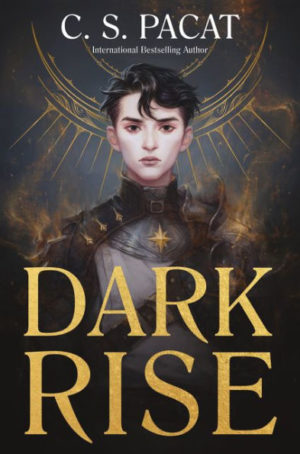
There was a very high pitched scream inside my heart when I learned that C.S. Pacat (she/her) would be releasing new work, and that it would be the start of a new trilogy. And look, some of Dark Rise may feel familiar—Will doesn’t know he’s from a magical world, but when his mother is killed, he’s brought into a magical battle between good and evil. Violet is a strong girl in a world full of bad men, sneaking onto ships dressed in her brother’s clothes and yearning to prove herself. And at the center of it all are the Stewards, an order of magical knights (sort of), who are the key to Will’s destiny. Now, hear me out: tropes are tropes for a reason, it’s really all in the telling. Pacat is a master at character design, and you’ll instantly fall in love with Will and Violet. OH and there’s a really cool magical black sword, and Pacat is very good at swords. The truth is that Dark Rise is just plain fun; it’s a good, well-designed fantasy with the right sprinkle of classic genre markers, in the hands of a talented writer.
We Light Up the Sky by Lilliam Rivera (October 5, Bloomsbury YA)
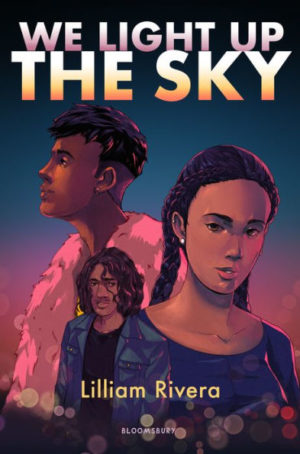
Lilliam Rivera (she/her) has become one of those auto-buy authors for me ever since Dealing in Dreams came out. She seems to be tackling different genres and nailing them with ease, and I really look forward to watching her continue to do so as her career grows. We Light Up the Sky is a first-contact story centering three Latinx teens. Let’s be honest: first contact stories are always, in some way, about colonialism. We can’t talk about aliens coming to earth without talking about invasion, culture clashes, assimilation, gentrification etc. But so rarely do we get to see this from the perspective of marginalized communities, who historically have the most experience with these topics. I’ll gently step away from my usual soap box here, but you get it. This story follows three inner-city kids and the alien that assumes the form of one of their dead family members. Rivera brilliantly refuses to divorce the sci-fi elements from contemporary issues—yes, there are aliens, but there are also still racist cops, there’s still poverty, there’s still homophobia, and we’ve got to deal with all of that. We are capable of dealing with all of that. We Light Up the Sky really looks at what first contact stories tell us about humanity, and just what it might take to save the world.
A Snake Falls to Earth by Darcie Little Badger (October 12, Levine Querido)
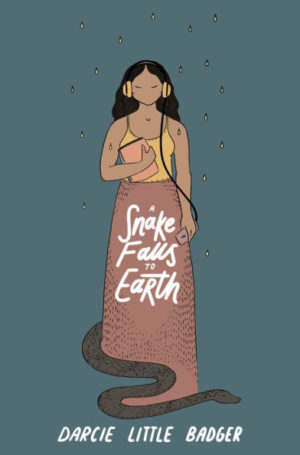
Darcie Little Badger (she/her) is an expert at exploring the way our world crashes against the magical. In Elatsoe, it was the titular protagonist who was able to breach the veil between the living and the dead. A Snake Falls to Earth imagines two distinct universes: Nina’s world is similar to ours, and Oli’s is more fantastical. When they suddenly come together, the two characters are thrust together in an unexpected way. But what’s really intriguing about A Snake Falls to Earth is its, shall we say, non-Eurocentric structure. Little Badger uses Lipan Apache storytelling techniques here, and infuses the story with her culture throughout. I think we’re so used to stories that follow a certain familiar path, popularized by European cultures and the hero’s journey beats, that it can be slightly jarring to venture outside that, but ultimately to our benefit as readers. There are a few books on this list that call on other cultural storytelling structures, and it’s a beautiful thing. Little Badger’s work centers family, friendship, and is well worth your time.
Flowers for the Sea by Zin E. Rocklyn (October 19, Tordotcom Publishing)
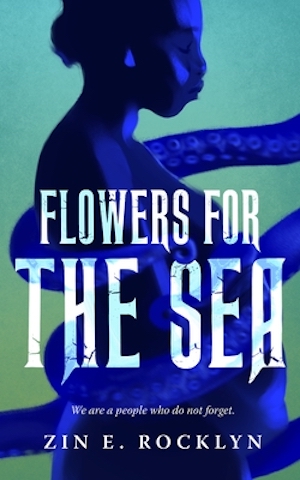
Zin E. Rocklyn (they/them) has been a secret star player of genre fiction for a while now and has widely published short fiction, so it’s no wonder the SFF world is abuzz with excitement for their debut novella. It’s dark and extreme and full of monsters, both literal and of the more human sort. The nims—a name given to their people by the Crown, a government which has systemically othered them—have fled a drowned kingdom and now struggle to keep generations alive aboard their ark. Food is dwindling along with morale. But Iraxi has it worse than most: her family having been burned alive as a result of her refusing the Prince’s marriage proposal, she is now left alone, pregnant, and covered in wounds. Iraxi may be the first one to give birth to a healthy baby on this ark, and that puts her in danger, both from others on board…and from the beasts, the razorfangs, that hunt through the night sky. And it’s entirely possible that her child could be one of them. Alternating between Iraxi’s present and her memories, Flowers for the Sea is not always pretty—Rocklyn doesn’t shy away from the sweat and stink of human bodies—but still incredibly poetic fantasy that takes on a range of human emotions.
Jade Fire Gold by June CL Tan (October 12, HarperTeen)
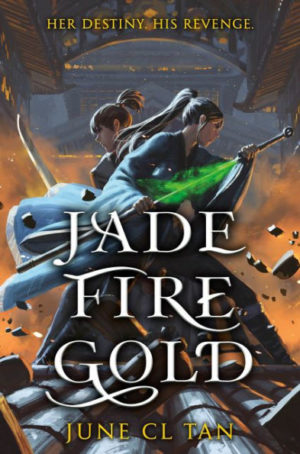
Jade Fire Gold is another one that I’ve had on my wishlist forever, not only because it was pitched as a take on the Zuko/Katara dynamic, but also because I love a broody prince. And it’s hard to do a good revenge arc, which is what makes June C.L. Tan’s (she/her) debut so exciting. In this story, magic is condemned by the empire, and those with magic are branded traitors. Ahn, a young country girl, has to hide the dangerous magic she has. She only wants to take care of her grandmother, and sets out in search of a way to do so. Everyone thinks Altan (my aforementioned broody prince) is dead, along with the rest of his family—but he’s only waiting for the moment to take everything back from those who hurt him. At first, Ahn and Altan are reluctant to trust each other, but they need each other to get what they want. Their destinies intertwine, and both learn and grow along the way…and maybe, just maybe, they grow closer to each other too. It’s a fast-paced story that deals with family, healing from trauma, and all the ways two people are fated to influence each other. There’s plenty of action, but plenty of poignant emotional moments as well. And a cave scene! What could be better?
Far From the Light of Heaven by Tade Thompson (October 26, Orbit)
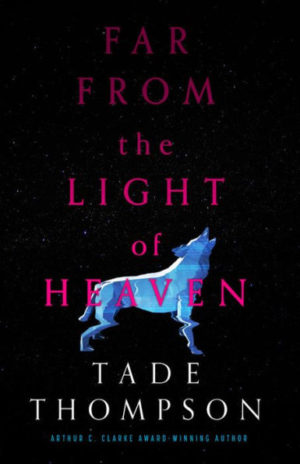
We talk a lot about the difference between Afrofuturism and Africanfuturism, and Tade Thompson’s (he/him) work is firmly in the latter category. His Wormwood trilogy, centering a near-future Nigeria, was A Moment in the sci-fi genre, and Far From the Light of Heaven, featuring a space station called Lagos, is expected to be no less. This space epic is set on the ship Ragtime, which is carrying a thousand sleeping passengers from Earth to a new planet. But space travel is never that easy, especially when most aboard are asleep for so long. The crew find themselves wrapped up in a mess they never anticipated, and all eyes are on First Mate Shell. There are just so many things that could go wrong; Thompson has set up a story with inevitable drama and tension with an expansive universe. Thompson’s command of the genre is without question, and this is set to be one of the biggest releases of the year.
Trashlands by Alison Stine (October 26, Mira Books)
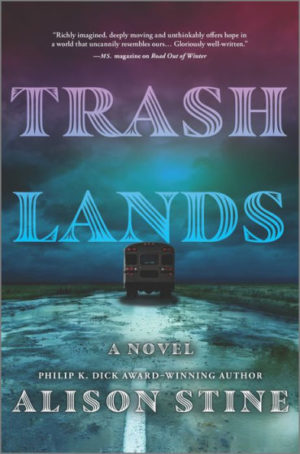
I really love climate fiction, or cli-fi, despite it often painting a dark picture of our future. Dystopias set in the aftermath of a huge climate disaster seem like the most likely way our society will go at this point, which makes it all the more important to read stories in this growing genre, and Alison Stine (she/her) has written an absolutely incredible contribution. Trashlands takes place in Scrappalachia, an area of the country that has been overlooked following a great flood. The Elite costal cities sometimes still have power, the Flyover region has farmland, Scrappalachia has trash that is scavenged, traded, and repurposed. Trashlands also happens to be the name of a strip club, because of course after everything goes to shit, strip clubs are still around. The novel follows Coral, a pregnant teen, as she moves through this universe and attempts to change her circumstances. Here, plastic is currency, as it can be broken down and repurposed, which…makes me feel a lot of things about our plastic usage. Trashlands perfectly balances that line between ‘this is a really wild story’ and ‘I gotta sit and think about the bigger picture here’, and it’s a real journey.
A Marvellous Light by Freya Marske (November 2, Tordotcom Publishing)
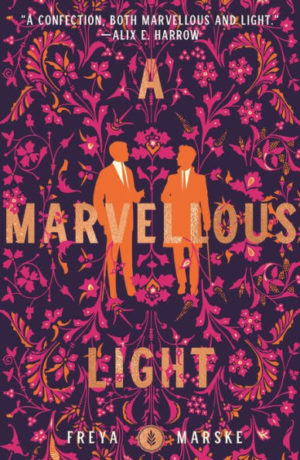
Every once in a while a book comes along with a summary that makes me go, oh, you wrote this for me? Just for me? Why thank you. And though my name shockingly does not appear on the dedication page, A Marvellous Light really does have it all: bookstores and libraries, devious magic-making, beautiful magic-making, a maybe-sentient old house, the fumbling of manners in the presence of a crush, an intriguing mystery, and two perfectly paired characters at the center of it. Robin has no idea what he’s in for when he’s given this small governmental job. He has no idea that magic exists until he meets Edwin on his first day, no idea that he’s meant to act as liaison between the magical government and the Prime Minister. He also has no idea that his predecessor hid something very valuable in his new office that dangers people are after. And he has no idea just how intwined his life is about to become with Edwin’s. A Marvellous Light is, simply, beautiful. There are sentences so delectable it wasn’t until my eyes started to hurt that I realized I’d been reading with my kindle practically touching my nose. Freya Marske (she/her) is just so good at what she does. So good. The prose waltzes across the page. It is the beginning of a series, and thank goodness for that.
Year of the Reaper by Makiia Lucier (November 9, HMH BFYR)
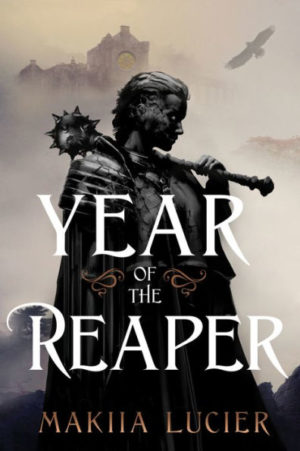
Now, I know what you’re thinking: wasn’t I just talking about how I couldn’t read any more pandemic novels? Fortunately, Year of the Reaper leans toward the historical side, and very much after the sickness has ravaged the kingdom, so we’re safe. That doesn’t mean it’s not dark, but it does make for a good story about life after trauma. Cas (or Lord Cassiapeus) has survived war, prison, and the plague, and came out the other side with the ability to speak with ghosts. He wants to go home and maybe get back to normal, but of course it can’t be that easy. Turns out, while he was away, his home has been taken over by the king and queen (who just happens to be from the kingdom they’re at war with). Oh and also there’s an assassin on the loose. The world is rough and complicated, but Cas is an enigmatic protagonist that’s worth following. There are some great twists and turns in this one, and a lot of complicated but well-rounded relationships. Makiia Lucier (she/her) packs a lot of plot into a very short amount of time, which means you’ve really got to hang on for this rollercoaster, but it’s well worth it.
Skin of the Sea by Natasha Bowen (November 9, Random House BFYR)
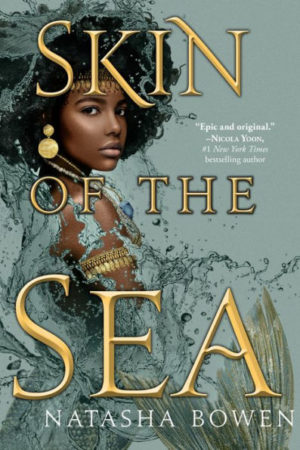
One of the most prevalent conversations in speculative fiction is around tropes or features previously deemed “overdone”, and who has been allowed to tell those stories. Because have there been too many mermaid stories, really, if all of the mermaids are white? Are we truly “done” if we’ve only seen them from a Western/Eurocentric perspective? I think not. Natasha Bowen (she/her) doesn’t seem to think so either. The legend of Madi Wata, a water spirit prevalent in African and African diaspora mythologies (I did my googling and couldn’t find anything more specific than ‘Africa’ so if anyone knows more, please correct me here) depicted with the head and torso of a Black woman and the tail of a fish. In Skin of the Sea, Simi (our Madi Wata) gathers the souls of humans who die at sea, which she finds a difficult emotional task. She is torn between land and sea, and burdened by memories of her past life as a human. When she betrays her purpose to rescue a boy in chains, she unwittingly angers the gods and is forced to reckon with her place in the world. Bowen has crafted a story that sparkles with life, and is very much more than just a mermaid story.
Those are my picks, and I love every single one of them. What titles are you excited for in the remaining months of 2021? I’d love to hear about what you’re reading!
Christina Orlando is the Books Editor for Tor.com, where they get to be a book nerd all day. As a freelance writer covering poetry, gender, and sexuality, their work has appeared Electric Literature, Catapult, gal-dem, THEM, Adroit Journal, and Book Riot. They are a 2019 recipient of Spotify’s Sound Up grant for people of color in podcasting and currently reside in Brooklyn, NY. Find them on Twitter at @cxorlando










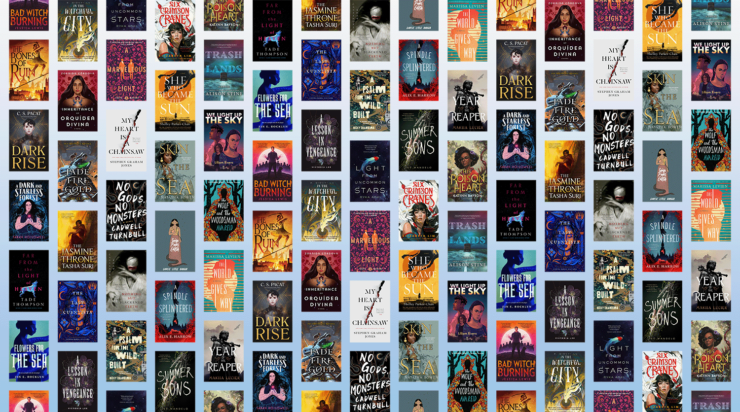
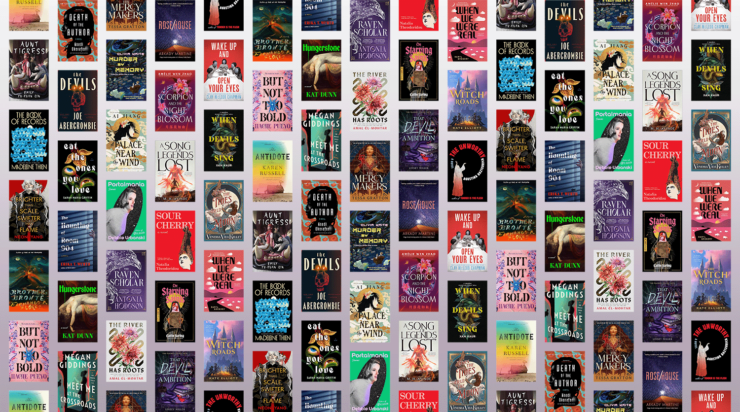
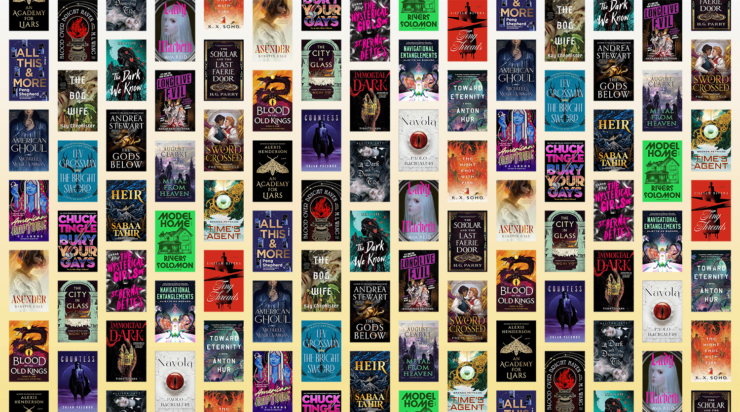
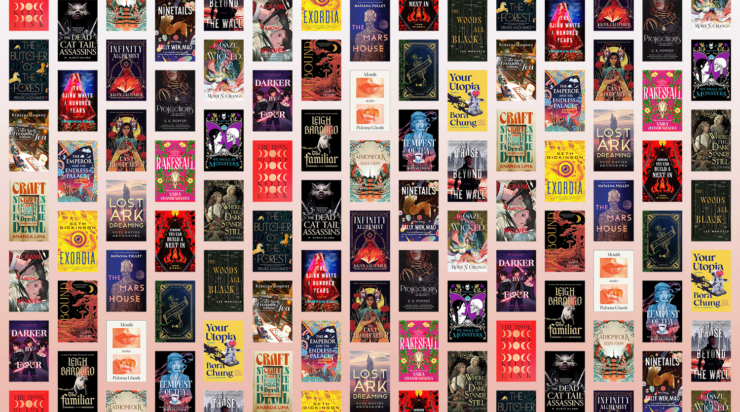
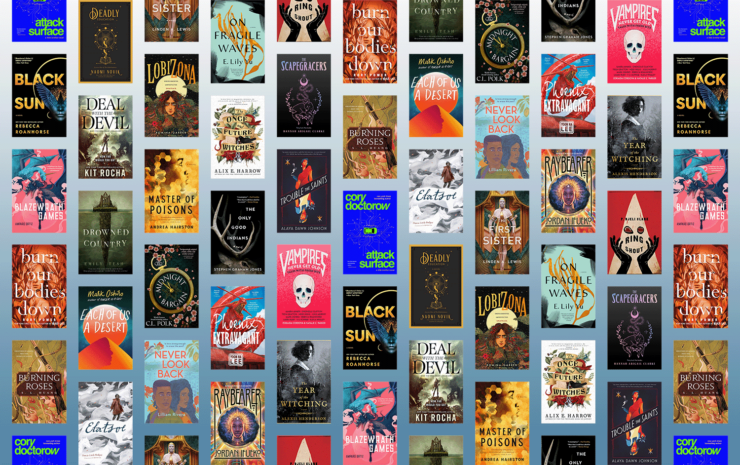
So many of these sound amazing!
This is when I wish I could post a GIF here. You know, the one that states: “Take My Money”!
Ada Palmer, Perhaps the Stars, finishing the Terra Ignota sequence. Dazzlingly brilliant, long-awaited. October 19, 2021 according to BigRiverRushingOutOfWallet.com
Aside from She Who Became the Sun, The Last Cuentista, and Dark Rise, none of these excite me. There’s a real paucity of epic fantasy, space opera and adventure-driven stories here. Most of these are romance-based, experimental/“genre-bending”, retellings or overly mired in YA tropes.
Also, Mami Wata is from Western Africa, particularly Liberia through Ghana, and is not a mermaid.
Just a week away: Catalyst Gate by Megan E O’Keefe, the third and final book in The Protectorate series.
I think it’s wonderful there are so many different styles of interesting books coming out, not simply ones that cater to Vlad!
Really looking forward to jumping back into Brian Staveley’s world in “Empire’s Ruin” and also to the conclusion of Bradley Beaulieu’s Song of the Shattered Sands series with “A Desert Torn Asunder”, both out in July.
Pretty psyched for Joe Abercrombie’s “The Wisdom of the Crowds”, coming Sept 14th!
There’s a new Alastair Reynolds novel out in August set in the Revelation Space universe, so that’s automatically my most anticipated book. There are also novels out from Ken MacLeod and Charles Stross, and novellas from Stross and Peter F Hamilton and Gareth Powell. I’d have thought that Naomi Novik and Ada Palmer were worth a mention too.
Oh, and there’s a Neal Stephenson book out too.
I’ll check put the Becky Chambers book, I’ll probably wait for the reviews on the others here.
The Dandelion Dynasty is a four-book series, not three, so we still have one more after The Veiled Throne–I think Speaking Bones is coming out next April, last I heard.
I understand that there are tons of genres out there. Epic fantasy and space opera are two of them. I’m just personally disappointed to see those genres, cornerstones of speculative fiction, unrepresented on this list to the point of near-total omission. I didn’t mean to disrespect others’ taste, just that alongside tropey YA romances and experimental metafiction, there could be room for some epic adventures as well.
I can’t wait for the new books by Staveley, Liu, Palmer, Okorafor, and Reynolds! Shame they weren’t on the list and weren’t considered “important” enough.
And no mention of Katherine Addison’s Witness for the Dead, which is the one I am eagerly awaiting, June 26, I believe.
Of ones not mentioned already, I’m most looking forward to Witness for the Dead, by Katherine Addison, and the early December release of Liar’s Knot, the second book in M A Carrick’s Rook & Rose series, since the first book The Mask of Mirrors turned out to be my favourite fantasy novel of the past 5-6 years.
There’s also the last book in the Expanse series, Leviathan by James SA Cory. Can’t wait for that one, but at least I’ll have Charlie Stross’s Invisible Sun finishing off his Empire Games series to keep me going.
Fantastic list! Saw some stuff I hadn’t seen before, so thank you! Now very intrigued by the Light from Uncommon Stars book.
Just a heads up, in the second paragraph, first sentence, not sure you meant to say “Panera Bread.” I have had pandemic auto-correct to Panera myself, but not sure that’s what happened! Either way, thank you very much for putting together this list. Definitely going to pick some of these up and make sure my library gets them too!
@19: Thanks!–“Panera Bread” was intentional in this case (the autocorrect has taken on a life of its own :)
On this list I am looking forward to… Psalm for the Wild Built, She who became the Sun and Trashlands. (Trashland sounds alot like WasteTide by Chen Qiufan and I really LOVED Waste Tide.)
My family is looking forward to Sanderson’s Cytonic in November.
*shivers delightfully* And their PTR list grew three sizes that day.
Quick shout-outs to a few books not mentioned in the article or comments that I’m excited about!!!
I’m not sure if it’s still coming out this year, but Mary Robinette Kowal’s The Spare Man supposedly comes out in July (19th?), about a murder mystery on a cruise between Earth and Mars!
Daryl Gregory’s Revelator, coming August 31 from Knopf, which I believe is Southern gothic weirdness! I heard a sample from him at World Fantasy 2018 and it sounded great; each of his books is wonderful, weird, and different!
Matthew Fitzsimmons’s Constance, coming September 1 from Thomas & Mercer/Amazon, about a clone investigating her own murder while trying to avoid it happening again!
Emily Skrutskie’s Oaths of Legacy (sequel to Bonds of Brass), coming September 14th (I’ll be getting the audiobook) — space opera with a little same-sex romance!
Marina J. Lostetter’s Activation Degradation, coming September 28th from HarperVoyager, which sounds cool!
I’ve had my eye on A Spindle Splintered, but (as a person with a chronic illness) I’m so SO afraid that the terminal illness will turn out to be curable…
For my part, there are quite a few of these on this list I’m looking forward to, and also Ada Hoffmann’s sequel to The Outside, called (I believe) The Fallen and coming in July.
I am waiting for the final book in the Expanse trilogy-trilogy. AKA Book#9.
There are about 6 books on this list I already have on pre-order (Khaw, Turnbull, Harrow, Jones, Thompson and Chambers). The one by Zoraida Cordova also looks interesting. Everything else all seems like a very narrow type of YA/YA adjacent fantasy that has absolutely zero appeal for me.
I’m looking forward to The All-Consuming World by Cassandra Khaw, The Book of Accidents by Chuck Wendig, The Last Graduate by Naomi Novak, Termination Shock by Neal Stephenson, When the Sparrow Falls by Neal Sharpson The Final Girl Support Group by Grady Hendrix, Under the Whispering Door by TJ Klune, and of course, The Witness for the Dead by Katherine Addison, which I can’t believe any decent list of this type would miss out.
Quality list!

I recently finished a review copy of The God is Not Willing by Steven Erikson (a new Malazan novel, set ten years after The Crippled God) and it is comfortably Erikson’s best work in well over a decade. 1 July in the UK, November in the USA.
intruguing list – introduced me to a few books I hadn’t heard of before. Sounds like some fun adventures coming out as well as some more serious stuff.
So grateful for the strength of the industry at the moment. Too much good stuff to capture any given list and something for everyone.
Wow, that Becky Chambers book sounds fantastic. Loved Wayfarers so looking forward to this one. Something not on the list for space/YA sci-fi fans is Chimera’s Prism by PJ Garcin, which is the second book in the Kardashev series. Read the first one (Mercury’s Shadow) last year and loved it, the universe is so inventive and the characters so rich. Too many books to read!!